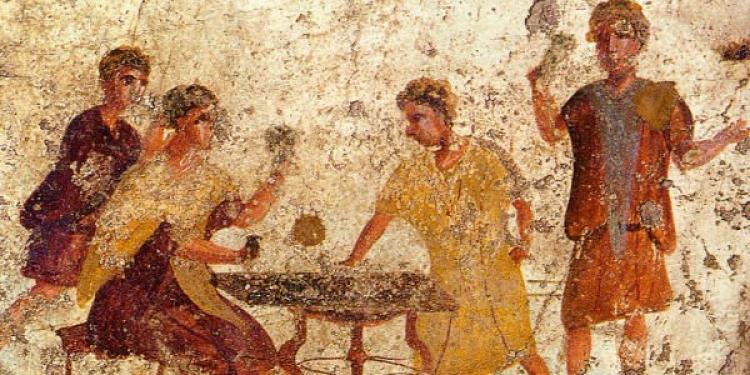Gambling in ancient Rome: from coin tossing to “latrones”
Posted: April 18, 2017
Updated: October 6, 2017

Gambling in ancient Rome was clearly perceived as entertainment, being separated from the ritualistic dimension ascribed to it in other ancient civilizations
Unlike in the other ancient civilization gambling in ancient Rome, started being clearly separated from its mythological aspects and was clearly considered as a way of entertainment, although an illegal one. However, as gambling news report, although it was not perceived as a ritualistic or religious practice it did have some mythological patrons.
Gambling and the Roman mythology
The Roman mythology knows of two Gods whose supernatural powers were able to help the players in a game to win or make some material gain: Mercury and Fortuna. Mercury is the Roman analogous of the Greek protector of gamblers, Hermes. He is considered to be a major Roman God, which brings financial gains, luck, and is able of trickery.
On the other side Fortuna is the Roman analogous of the Greek goddess Tyche. She was widely regarded as the ruler of fortune and chance. However, she had an ambivalent nature since sometimes she was considered to bring “good forutne” or “good luck” but at others rather “bad”. She remained, as online gambling sites in Italy claim, to be a symbol of wealth and prosperity in the Roman Empire, and was called upon by gamblers when wagering and making bets.
Games Romans played
Most of the games that the Romans played were taken from the Greeks. Thus, similarly to the Greeks the Romans played “guessing games”. These games were of a different type. Some of them were an adaptation of the “Head or Tail” game. In the Roman world this game was usually called “Head or Ship” because the Roman coins were such that on the one side they had a Roman galley while on the other the head of the Janus, the Roman God of gates, passages, transitions.
• Fortuna and Mercury were the gods associated with gambling
• Dice games in ancient Rome are even mentioned in the Bible
• Latrones was the most famous board game played in ancient Rome
Dice games were however the most popular pastime in ancient Rome. The simplest Roman dice games involved the throw of three or four pairs of dice. The best throw and the highest result were sixes on all dice. The worst throw showed all ones. This kind of dice throwing is reported to take place even in the Bible, where it is said that the Roman guards casted lots for the clothes of Jesus during the Crucifixion. The dice depending on the period were made out of bones, silver, bronze, wood, stone, shells and ivory.
The Romans also played a wide variety of board games, the most famous of which were the Latrunculi or Latrones which was the Roman Chess as well as Tabula which was the Roman Backgammon. Latrunculi, or latrones means “the game of brigands”,and was very similar to the Greek game petteia or pessoi which founds references even in Homer’s time.

This was a strategic board game for two players, including a special board, coins/stones and dice. The aim was to capture the coins/stones of the opponent. Among the Romans, the first mention of latrunculi is made by the Roman author Varro in the second century AD. Until today sevral attempts for its reconstruction are made the most famous being by Ulrich Schädler and R.C.Bell.
On the other side, “tabula: was also a popular game in the Roman world. This game is the Roman form of today’s backgammon. It was called tabula, which means ‘table’, since it was played on a special board. Unlike latrunculi, which was considered to be more of a strategic game tabula was clearly classified as “alea”, which means “gambling”. Online gambling sites in EU report, that this game has lots of similarities with the Egyptian Senet, which dates back to at least 3000 BCE and which was the forerunner of another popular roman board game from the early period, the Duodecim Scriptorum.












